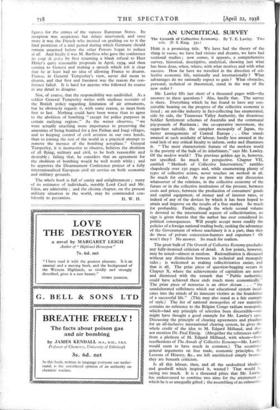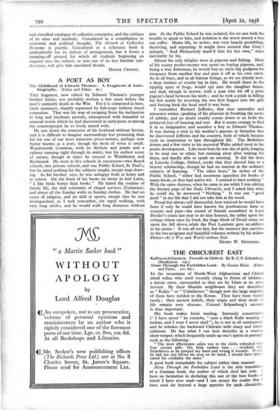AN UNCRITICAL SURVEY
The Growth of Collective Economy. By T. E. Lawley. Two vols. (P. S. King. 35s.)
HERE is a promising title. We have had the theory of the thing in vacuo, we have had visions and dreams, we have had sectional studies; now comes, it appears, a comprehensive survey, historical, descriptive, analytical, showing just what has been done, when, where, with what motives and with what success. How far have we travelled in the direction of col- lectiVe economic life, nationally and internationally ? What advantages do we rationally expect to gain ? What obstacles, personal, technical or theoretical, stand in the way of the new order ?
Mr. Lawley fills just short of a thousand pages with—the answers to these questions ? Alas, hardly that. The survey is there. Everything which he has found to have any con- ceivable bearing on the progress of the collective economy is listed ; an ant-like industry in fact-collecting has enumerated, side by side, the Tennessee Valley Authority, the disastrous Soldier Settlement schemes of Australia and the communal pig-pounds of Ruritania ; the co-operative 'movement, the sugar-beet subsidy, the camphor monopoly of Japan, the barter arrangements of Central Europe . . . One stands amazed at such assiduity of labour, hardly less amazed at the total lack of any critical faculty to inform, order and illuminate it. " The most characteristic feature of the modern world is the poverty of the bulk of its inhabitants," says Mr. Lawley. Of the modern world ! The previous golden age is, however, not specified. So much for perspective. Chapter VII, entitled " Methods of Collective Intervention," rambles shapelessly over 25o pages and, while enumerating plenty of types of collective action, never touches on methods at all. So much for order. At no point is there any discussion whatsoever of the relations, in the collective economy of the future or in the collective institutions of the present, between costs and prices, between the production of consumers' goods and capital equipment, of money and of interest rates, or indeed of any of the devices by which it has been hoped to attain and improve on the results of a free market. So much for profundity. Finally, though the whole second volume is devoted to the international aspects of collectivisation, no sign is given therein that the author has ever considered its political consequences. Will people accept more readily the policies of a foreign national trading body, seeking the advantage of the Government of whose machinery it is a part, than they do those of private concession-hunters and exporters ? Or won't they ? No answer. So much for realism.
The great bulk of The Growth of Collective Economy precludes any fully-itemised criticism of detail. A few points, however, may be noted—almost at random. Rationalisation is discussed without any distinction between its technical and monopoly sides ; is welcomed as making collectivisation easier, and that is all. The prize piece of question-begging occurs in Chapter X, where the achievements of capitalism are noted and dismissed with the remark that " Public authorities could have achieved these ends much more economically." The prize piece of nonsense is an obiter dictum . . . " the unadulterated selfishness which our educational system incul- cates into the minds of its innocent victims as the foundation of a successful life." (This may also stand as a fair example of style.) The list of national monopolies of raw materials contains no reference to the Belgian Congo radium monopoly. which—had any principle of selection been discernible—one might have thought a good example for Mr. Lawley's case. Discussing the principle of clearing agreements and pleading for an all-inclusive international clearing system, he gives the whole credit of the idea to M. Edgard Milhaud, and does not mention Dr. Paul Einzig. (Altogether the references suffer from a plethora of M. Edgard Milhaud, with whom—from recollections of The Annals of Collective Economy—Mr. Lawlcy would seem to have much in common.) The occasional general arguments on free trade, economic principles, th2 Lessons of History, &c., are left uncriticised simply becaus. they are beneath criticism.
Is all this labour, then, and all the undoubted idealism and goodwill which inspired it, wasted ? That would 13,- saying too much. It is a thousand pities that Mr. Lawle:. has endeavoured to combine two aims for the attainment 0' which he is so unequally gifted ; the assembling of an exhaustive and classified catalogue of collective enterprise, and the critique of its aims and methods. Considered as a contribution to economic and political thought, The Growth of Collective Economy is puerile. Considered as a reference book it undoubtedly has its defects of arrangement, but it forms a jumping-off ground for which all students beginning an enquiry into the subject, or into one of its less familiar sub- ciLisions, will give him unstinted thanks.
HONOR CROOME.











































 Previous page
Previous page